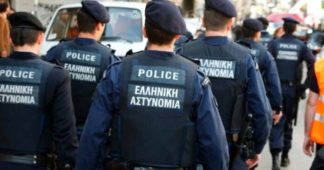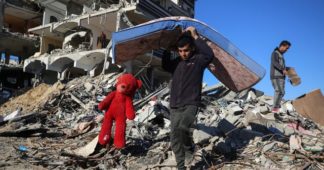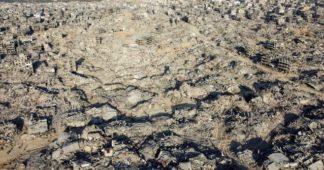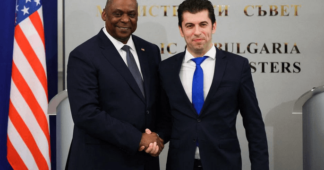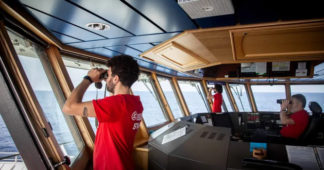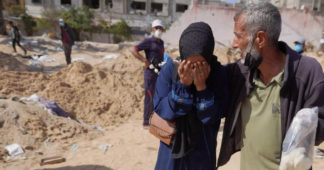Dog paw and boot prints were found in the snow surrounding the frozen bodies, suggesting the police had left them there
By Katherine Hearst
17 January 2025
Activists have reported that their attempts to rescue three Egyptian teenagers who died of hypothermia near Bulgaria’s border were blocked by police.
Two volunteer-run search and rescue groups, No Name Kitchen (NNK) and Collettivo Rotte Balcaniche, tried to reach the boys, identified as Ali, Samir, and Yasser, aged 15, 16, and 17, who were lying unconscious in the snow in the forests near the city of Burgas.
“On the morning of 27 December, we received the first alert from an unknown number,” Tomas, a member of Collettivo Rotte Balcaniche, who used a pseudonym, told Middle East Eye.
They received a video showing a boy who was unconscious but clearly alive, along with map coordinates.
They then received a second and third alert, all from different numbers, and rushed to the locations while on the phone to Bulgaria’s 112 emergency line.
Tomas explained that they tend to call 112 late in the rescue attempt, as previously, when they contacted the number, they were then blocked by the police, or arrived to find the police had already conducted a pushback.
“In this case, the guy was basically about to die as he was laying in the snow. So we didn’t want to wait,” he said.
But as they neared the location they found their path barred by a police vehicle. The police instructed them to turn back to Burgas.
Minutes later a second car arrived and escorted them back to the city, while the other continued on towards the location of the person in distress. The group were barred from returning over the next 24 hours.
Over the following two days, the groups returned to the scene to find three frozen bodies. NNK discovered the first, reporting that they had found dog paw and military boot prints in the snow surrounding his body.
“We think the police went there, found the guy and left him there”, Tomas said. “We don’t know if, when they arrived, he was dead or alive”.
The second was discovered later that day, and the third, the following day. It had been left so long, animals had mauled it.
Collettivo Rotte Balcaniche and NNK called 112, giving them the location of bodies.
Once a forensic team had examined the bodies, the police instructed Tomas to dump one of the bodies in the trunk of their car.
“I tried to say no, but they threatened me with legal action so I really didn’t have a choice… I had to do it”, he said.
The Bulgarian Border Police denied allegations that they ignored the distress calls. According to Balkan Insight, they said they “reacted immediately to all received signals but the alerts from 27 December featured wrong or misleading information”.
‘Dying without a trace’
The teenagers’ deaths are not isolated incidents.
In recent years, illegal pushbacks and violence against migrants by the Bulgarian police on the Turkish border have soared.
Bolstered by EU funds and the involvement of the European border agency Frontex, Balkan countries have erected higher fences and ramped up their border controls, with border police acting with greater impunity to bar people from entering.
After Bulgaria joined the Schengen zone on 1 January, Interior Minister Atanas Ilkov pledged to “strengthen our capacities” on the Bulgarian-Turkish border.
A 2023 investigation by Lighthouse Reports and other European media outlets found that since 2015, increasing numbers of migrants were “dying without a trace” along the treacherous Balkan route from Turkey to Germany.
It concluded that the “hostility people face at the borders of Europe in life continues into death”.
Collettivo Rotte Balcaniche formed in the wake of the distastrous fire at the Lipa camp site in Bosnia, but transferred to Bulgaria in the summer of 2023 after hearing reports of pushbacks by the police and deaths of people on the move.
“There were no grassroots organisations there, and there wasn’t much coverage of pushbacks,” Tomas said.
The group initially distributed aid, but they began to perform search and rescue missions when they started receiving increasing alerts from people stranded in Bulgaria’s forests while attempting to cross the Turkish-Bulgarian border.
In the absence of any rescue efforts from the authorities, NNK and Collettivo Rotte Balcaniche are the only groups doing this work. Their phone numbers, shared by people on the move, now function as a makeshift helpline for people navigating Bulgaria’s forests.
“Our numbers are shared between communities, at first we were seeing a lot of alerts from Syrians, and now a lot from Egyptians,” Tomas said.
Part of a policy
When the bodies arrive at the overflowing morgues, the process of identifying them is also left to the third sector – a Bugarian grassroots organisation called Mission Wings.
“Authorities are not involved in the identification of bodies, and that’s why the morgues are full. The bodies usually stay there for months,” Tomas said.
The Lighthouse Reports investigation identified the bodies of 155 people presumed to be migrants or refugees who wound up in morgues close to borders along the route.
It found that “state authorities make little to no effort to identify dead migrants or inform their families, while individual doctors, NGO workers and activists do what they can to fill in the gaps. Unidentified bodies end up piled in morgues or buried without a trace”.
According to Tomas, the police’s negligence of the three boys is no accident.
“This fits with the patterns we have observed in the year and a half we’ve been in Bulgaria”, Tomas said.
“It’s almost a policy to abandon the bodies, because it’s seen as an administrative burden by the police. There are reports of the morgues being full of the bodies of people on the move.”
According to Tomas, the bodies of the three boys were identified with the help of Mission Wings, and have now been repatriated to Egypt where funerals were held.
We remind our readers that publication of articles on our site does not mean that we agree with what is written. Our policy is to publish anything which we consider of interest, so as to assist our readers in forming their opinions. Sometimes we even publish articles with which we totally disagree, since we believe it is important for our readers to be informed on as wide a spectrum of views as possible.
